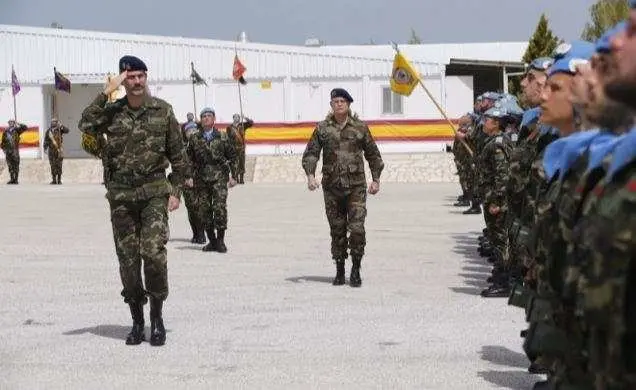Lebanon: the UN, impassive witness of the war

During the almost 19 years of operation of the United Nations Interim Force in Lebanon (UNIFIL), the United Nations Interim Force in Lebanon (UNIFIL) has provided protection, indirectly and unawares, to the enormous military growth of the Hezbollah organization, preparing the status quo for a potentially catastrophic conflict that threatens to engulf the entire region.
Since 1978, the United Nations has had a force deployed on the Israel-Lebanon border. In that year, Palestinian militants entered Israel by sea from Lebanon and massacred 38 civilians, including 13 children, in an attempt to provoke the collapse of peace talks between Israel and Egypt, which eventually led to the Camp David Accords.
Within weeks of Israel launching an operation to force Palestinian terrorist groups out of southern Lebanon, UNIFIL was established and deployed in the region. This rapidly formed, small force deployed with a restricted mission and limited capabilities, inadequate to perform the role of interpositioning.
Further Palestinian cross-border attacks could not be prevented, leading to the Israeli invasion of Lebanon in 1982. In the 1990s, it also failed to prevent a new wave of attacks by Hezbollah, an organization that emerged from the Lebanese civil war as the main proxy of the Islamic Republic of Iran in its struggle against Israel. In 2006, six years after Israel's full withdrawal from southern Lebanon, UNIFIL's contingent of 2,000 military personnel was unable to prevent Hezbollah from launching a multitude of rockets into Israel.
According to UN Security Council Resolution 1701, passed in 2006, UNIFIL's mandate was to ensure, among other things, that the area between the Litani River and the so-called Blue Line, the de facto border between Israel and Lebanon some 30 km south of the river, was “free of armed personnel, assets and weapons other than those of the Government of Lebanon and UNIFIL”.
The UN resolution also urges UNIFIL to “take all necessary measures in the areas of deployment of its forces and as it deems possible, to ensure that its area of operations is not used for hostile activities of any kind.” Regrettably, it can be seen that UNIFIL has largely failed to fulfill this mandate.
To implement this resolution, UNIFIL's contingent was strengthened to 10,000 troops, the largest deployment of UN forces. However, 18 years later, Hezbollah is estimated to have nearly ten times as many rockets as it had at the end of 2006, possesses a multitude of weapons caches and dominates territory south of the Litani.
UNIFIL is also restricted in its ability to patrol by the action of the Lebanese Army (LAF), whose work is not distinguished by its effectiveness. The LAF is estimated to be returning previously confiscated weaponry to Hezbollah, while Palestinian militants are constantly firing rockets into Israeli territory, just short of enclaves occupied by UN units.
Part of the problem with UNIFIL is that its mandate is governed by Chapter VI of the UN Charter, which prevents it from taking forceful action except in self-defense. This has not only prevented it from curbing the growth of Hezbollah, but exposes its personnel to attacks by the terrorist group and its supporters, which have resulted in casualties on several occasions.
Attempts by Israel and the United States to give UNIFIL units greater freedom of action to act against violations of Resolution 1701 have been blocked at the UN, in particular by China, Russia and also France. UNIFIL's status is estimated to have served, at times, as a shield for Hezbollah's protection for 18 years, without preventing the construction of its network of tunnels and its arsenal of Iranian-supplied rockets and weapons on Israel's border.
While Hezbollah was consolidating its position as the world's most lethal terrorist group, stockpiling ammunition and equipment below the surface, it apparently maintained a relative calm on the border with Israel. That calm was shattered on October 8, 2023, the day after Hamas's vicious massacre of civilians and capture of hostages in southern Israel, when Hezbollah launched its own offensive in solidarity with its Iranian ally, launching 8,300 rockets, 1,500 anti-tank missiles and hundreds of drones over northern and central Israel.
Northern Israel has been practically depopulated and 70,000 people have had to leave their homes. In turn, the UN Security Council has not condemned Hezbollah, while other members blocked U.S. attempts to censure its actions. After months of building up combat power on its front with Hamas, in recent weeks Israel has moved into action, first by detonating Hezbollah pagers and radios, and then by bombing Hezbollah targets throughout Lebanon.
Meanwhile, Secretary General Guterres and several world leaders have turned to warn against “escalation” while calling for a cease-fire. Had a proper and effective mission been mandated at the time, a UNIFIL with the military capability to disarm Hezbollah and enforce Resolution 1701, this latest round of violence could have been avoided.
In any case, the countries that have participated in UNIFIL would have something to say. The tragedy in Lebanon also has ramifications for Gaza. There has been talk in diplomatic circles of forming an international “interim” force that would help govern Gaza and monitor compliance with a cease-fire agreement.
However, the UNIFIL example is not encouraging to say the least. Following the UNIFIL model in Gaza would merely serve as a front for Hamas, like Hezbollah, to reinforce its tunnels, while, on the surface, the international force and NGOs would act as screens. No wonder the Israelis have little confidence in an “international” solution to either crisis.

